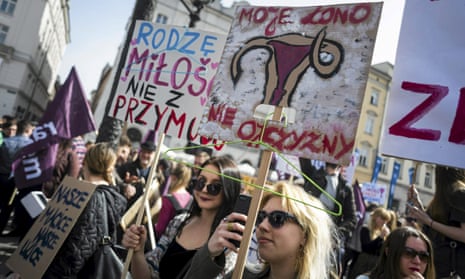Women’s groups and human rights campaigners in Poland have staged protests against a proposed new law that would criminalise nearly all abortions.
Thousands gathered outside the national parliament in Warsaw while there were demonstrations in several other Polish cities – and a separate event outside the Polish embassy in London – to oppose a measure that would outlaw terminating pregnancies except where necessary to save a woman’s life.
Poland, Europe’s most devoutly Catholic country, already has some of the continent’s most stringently anti-abortion statutes.
Legislators are expected to start debating on Wednesday even tougher rules drawn up by a rightwing thinktank with the backing of the Catholic church and the Law and Justice (PiS) governing party. A petition supporting the crackdown has gained more than 100,000 signatures.
If passed, the legislation would introduce jail sentences of up to five years for causing “the death of a conceived child”. It would apply both to women seeking abortions and doctors and health professional carrying them out.
Gathering under the slogan “Save women, not a step further”, opponents argued that the change would risk the lives of women and force girls as young as 11 who had been raped or subjected to incest either to give birth or face going to jail.
Krystyna Kacpura, director of the Federation of Women and Family Planning, said many Polish women were already in effect denied access to legal abortions despite a 1993 law that was supposed to allow terminations in cases of rape or incest, where the foetus is severely damaged or ill, or where the mother’s life is at risk.
Fewer than 1,000 legal abortions are carried out in Poland each year, according to the health ministry. But independent groups have estimated that between 80,000 and 190,000 Polish women undergo terminations annually, either in “backstreet” procedures or by travelling abroad.
“The existing law is one of the most restrictive in Europe,” Kacpuro said. “Getting access to their legal abortion rights is already a hard road for many women. For example, in Podkarpackie region in southern Poland, all the hospitals and doctors have signed a conscientious objection letter refusing to carry them out.
“So effectively we already have no legal abortions in Poland. But at least women are not yet criminalised. And if there is a real threat to a pregnant woman’s life, the doctor will save her.”
The proposed legislation has triggered several protests since it was first announced in April, with women staging walkouts during Mass and some even trying to shout down Catholic priests who spoke in favour of it.
It will be brought before parliament along with a counter-measure calling for freer access to abortion, which has gained the signatures of 215,000 supporters. However, even Poland’s main opposition party, the Civic Platform, has opposed liberalising the abortion law.
Opinion polls have shown ambivalent attitudes among many Poles. While nearly seven in 10 view abortion as immoral, only a small number favour a total ban, and most support it when a woman’s life is at risk.
Mariusz Dzierżawski, the head of Poland’s Stop Abortion committee, said 58% of Poles backed the proposed new law, adding that it was necessary because “about 1,000 unborn children are legally killed in Poland each year”.
He said: “Being suspected of having Down’s syndrome is enough to be killed. It must change. We do not fear abortion supporters as they are weak and there are few of them. The pro-life movement is much stronger in our country. We will force the politicians to ban killing people.”
The abortion fight is one of several controversies to have riven Poland since the PiS won a majority in last October’s general election.
The European Union has launched an investigation into whether the party has breached its standards on “democracy, human rights and the rule of law”, including over the government’s alleged interference in the country’s highest constitutional court and proposed increased surveillance powers.
